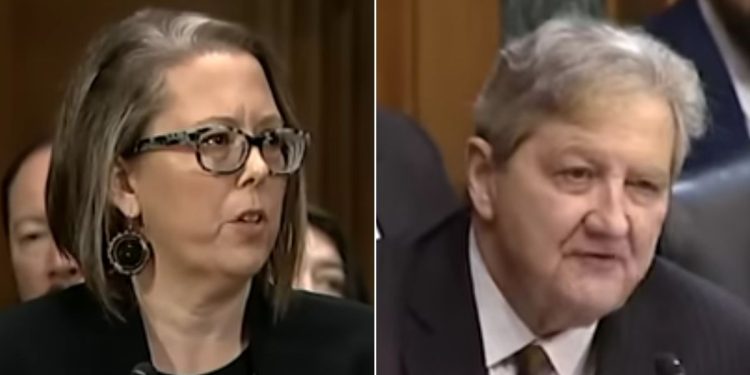A judge is the final arbiter in a courtroom.
In some cases, a judge can even override a jury verdict if he or she feels there was insufficient evidence to support the verdict or if there was an error in applying the law.
Given this tremendous responsibility, one would expect judicial nominees to possess extensive legal expertise. At a minimum, they should demonstrate a mastery of basic concepts taught in law school.
But as Republican Sen. John Kennedy of Louisiana proved — that is not always the case.
Kennedy, who is a member of the Senate Judiciary Committee, had a judicial nominee for the U.S. District Court for the Northern District of Oklahoma, Sarah Hill, stumped over some basic questions in a hearing on Wednesday, even though she may have received a “cheat sheet” from the White House in advance.
If confirmed, Hill would be the first Native American woman to serve as a federal judge in Oklahoma, according to KOKI-TV.
At one point in the conversation, Kennedy asked Hill what “collateral estoppel” was.
Hill answered, “Um, I think collateral estoppel … well … Senator, I will say that my practice, my 20 years of practice has primarily been dealing with issues relating to … um … criminal law or relating to other areas of the law.”
“If you don’t know, just tell me,” Kennedy responded.
“I certainly do know collateral estoppel — I’m finding that the bright lights of the moment are making it hard for me to recall it,” Hill replied, probably forgetting that being a district court judge requires being in the bright light of public attention every day.
“Okay, so you don’t recall it … okay,” Kennedy retorted.
A few questions later, Kennedy asked Hill, “What is the difference between a stay order and an injunction?”
“A stay order would prohibit … sorry … an injunction would restrain the parties from taking action. A stay order – I’m not sure that I actually can give you the …,” Hill answered uncertainly.
“Okay,” Kennedy responded calmly, moving on to his next question, which was, “Tell me about the multi-district litigation statute.”
“So, I’m not extremely familiar with multi-district litigation …” Hill responded uncertainly again, going on to give a vague answer but finally confessing that she was not “super familiar with all the ins and outs of that.”
At the end of the questioning, Democrat Sen. Dick Durbin of Illinois congratulated Hill on “surviving the John Kennedy six-minute bar exam,” but it seemed as if Kennedy had a suspicion the nominee may have had a little additional help from the White House.
“Did the White House give any of you any written materials to use to prepare … or digital materials?” Kennedy, who has stumped other Biden judicial nominees with his questions before, asked the nominees.
“They gave us, you know, questions … previous questions that had been asked,” Hill responded, looking around nervously.
“And answers?” Kennedy asked.
“Um … I think we had to go find the answers ourselves; I think we had to go watch the various committees …” Hill answered.
“May I have a copy of that?” Kennedy asked, probably to make sure he doesn’t reuse any of the questions the White House is giving federal judge nominees in advance.
Hill responded that she didn’t have one, but agreed to get it to him after he pressed her on it.
“It’s literally just a list of questions,” she responded, making Kennedy’s unspoken point.
“Senator, can we have a copy of your list of questions to share with other members?” Durbin chimed in, perhaps trying to deflect from Kennedy’s pointed questioning about the “list of questions.”
“Sure!” Kennedy replied. “I’ll even give you the answers.”
“It’s like a bar review course,” Durbin told the nominees.
The fact that Hill did not have answers readily available for basic legal questions, even after the White House provided her a “CliffsNotes” style study guide of commonly asked questions, raises grave concerns about her qualifications to be a judge — concerns Kennedy artfully exposed through his questioning and comments.
Biden judicial nominee Sara Hill “made history” by being the first Native American woman nominated to serve as a federal judge in Oklahoma
Today, she was unable to explain the difference between a stay order and an injunction when asked by Sen. Kennedy. pic.twitter.com/i6VsjXjvhk
— Greg Price (@greg_price11) November 15, 2023
This embarrassing exchange highlights deeper issues with both the quality of nominees being put forward and the confirmation process itself.
The American people deserve judges who are highly skilled, ethical and fair. Lifetime appointments require candidates who are the absolute cream of the legal profession.
Instead, we see partisan ideologues pushing through candidates who are dangerously underqualified in sham Senate hearings that have already been “rigged” by the White House.
This article appeared originally on The Western Journal.


























 Continue with Google
Continue with Google